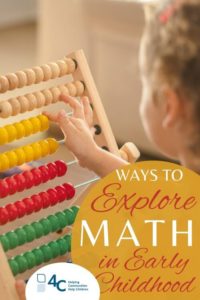
November 2022 – Published by 4-C
Many adults find math intimidating and may shy away from intentionally engaging with mathematical concepts in their early childhood classroom. But math doesn’t have to be scary! There are plenty of ways to include these concepts into a child’s environment and daily play. By introducing different opportunities to problem solve, think critically, and apply new concepts, you’re providing a child with the foundations of mathematical ideas that will enhance their future learning.
Introducing Math to Children
For many children, math can be a difficult subject to understand. Not all math concepts are as intuitive to some children as they might be to others, which is why your role as a parent and/or teacher is so important. For children to succeed in math, there are a number of ways to help them practice and improve their skills, ease them into new concepts they may not have experience with, and encourage curiosity as they learn. Below are a few tips you can use when teaching children about numbers and math:
Start Small
Counting and manipulating smaller numbers, like numbers 1 through 5, are easier for early math learners. Ensure children have an understanding of the fundamentals and then you can challenge them to larger numbers.
Use Objects
Use objects such as fingers or toys to represent quantity. You can use both hands to represent numbers under 10. You can also use objects for counting, which supports dual language learners and allows children to make connections to numbers and quantities through materials without depending so much on language.
Practice Daily
Find opportunities to compose and decompose numbers across the day during children’s routine activities and make this a daily routine. For example, during snack time, prompt children to find different ways to group their snacks. You can also use stories to connect problems to mathematics. This helps children connect to and make sense of number operation.
Read About It
Check out these great children’s books featuring different math concepts such as counting, shapes, measuring, and more!
- Round Is a Tortilla: A Book of Shapes
- Pete the Cat and His Four Groovy Buttons
- Chicka Chicka 1, 2, 3
- Tangled: A Story About Shapes
- Ten Black Dots
- Inch by Inch
- Feast for 10
- Fish Eyes: A Book You Can Count On
- Look Grandma! Ni, Elisi!
- One is a Piñata : A Book of Numbers
When children learn how to compose (add) and decompose (subtract) numbers they can begin solving problems involving numbers in their everyday lives. Using the knowledge they gain about number composition, children will later be able to intentionally engage with addition and subtraction using what they have already learned about number composition.
As a result, children can learn the importance of math first-hand and how it can easily be applied to the things they do and games they play. This early introduction to math can help them stay confident in their new and developing abilities.
Additional 4-C Resources:
- 4-C Blog: A Solid Foundation for STEM
- 4-C Pinterest Board: Math Ideas
Other Resources:
- NAEYC: Playing Around with Number Composition
- NAEYC: 5 Ways to Build Math into Your Child’s Day
- Early Childhood Education Blog: The importance of math in the early years
